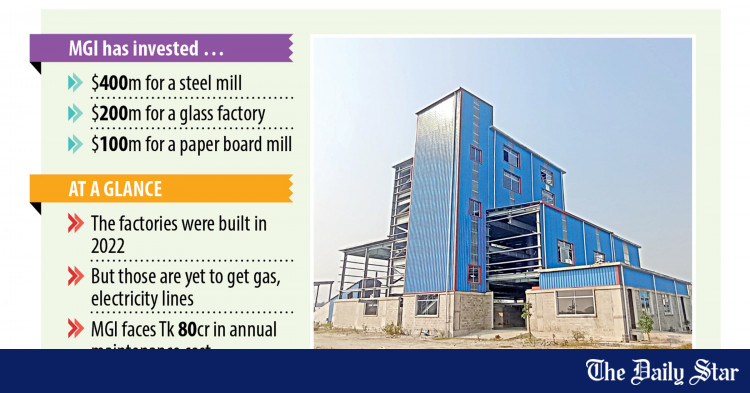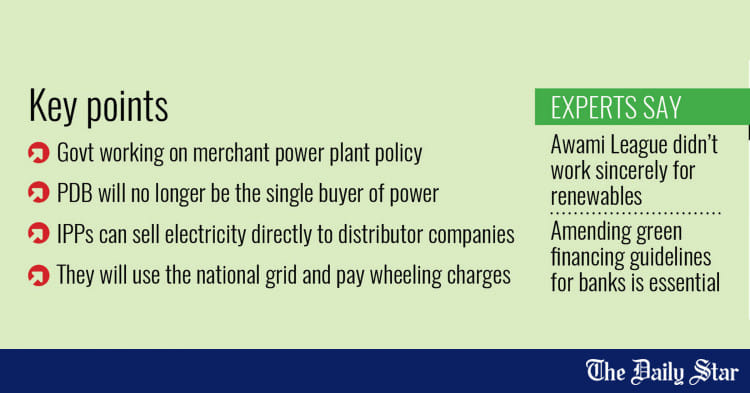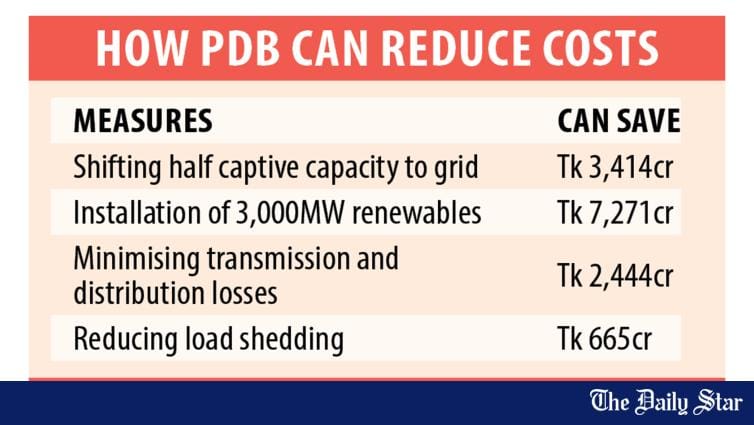- Copy to clipboard
- Thread starter
- #241
Saif
Senior Member
- Joined
- Jan 24, 2024
- Messages
- 15,397
- Reaction score
- 7,865
- Points
- 209
- Nation

- Residence

- Axis Group


MGI’s $700m investment in Cumilla EZ stuck in energy crisis
Three production units owned by Meghna Group of Industries (MGI) have been sitting idle inside the Cumilla Economic Zone despite two years having passed since construction works were completed due to a lack of gas and power connections
MGI’s $700m investment in Cumilla EZ stuck in energy crisis

Three production units owned by Meghna Group of Industries (MGI) have been sitting idle inside the Cumilla Economic Zone despite two years having passed since construction works were completed due to a lack of gas and power connections
The industrial conglomerate has already invested $700 million in the three units, with $400 million going towards a steel mill, $200 million for a glass factory and $100 million for a paperboard manufacturing unit, according to Mostafa Kamal, chairman and managing director of MGI.
Additionally, the company has been incurring around Tk 80 crore in annual losses since 2022 to maintain the inactive units, Kamal said.
Officials blame the previous government's allocation of land to the private sector players without adequate assessment
He added that the Bangladesh Economic Zones Authority (Beza) could not provide any answers about when gas and power supplies would be ensured. Instead, public officials blame the previous government's allocation of land to the private sector players without adequate assessment.
The Cumilla Economic Zone, located in the district's Meghna upazila along the Dhaka-Chattogram highway, spans 350 acres.
While recalling the tumultuous timeline so far, Kamal said BEZA held a multilateral meeting featuring representatives from the Gas Transmission Company (GTCL), Petrobangla, Titas Gas Transmission and Distribution Company Limited (TGTDCL), Cumilla EZ and the Energy Division in 2022.
Various decisions were made to speed up the process of providing electricity and gas connections, but none have had any tangible impact yet.
To speed up the connection process, Kamal said MGI even provided an additional Tk 100 crore for the development of the grid network and Tk 100 crore for GTCL's pipeline infrastructure.
But the slow rate of progress is frustrating, he added. Ashik Chowdhury, executive chairman of both Beza and the Bangladesh Investment Development Authority (Bida), said discussions were underway with MGI and utility service providers to find a solution.
An inter-ministerial meeting will be held to speed up the process of providing gas and electricity connections to the economic zone, he added.
Chowdhury also blamed the previous government's "indiscriminate" land allocation to the private sector for the current situation.
Shahnewaz Parvez, the managing director of TGTDCL, said they could not currently provide new connections to industries and economic zones due to an ongoing national gas crunch.
A meeting regarding gas connections for economic zones was held by Petrobangla recently, where it was decided to seek a final decision from the Ministry of Power, Energy and Mineral Resources, Parvez said.
He added that the situation could worsen if adequate liquefied natural gas is not imported.
Abdur Rashid Khan, managing director (additional charge) of PGCB, said they provide high-voltage industrial connections while distributors like the Bangladesh Rural Electrification Board (BREB) give connections to private economic zones.
"I am not aware of any application from the Cumilla Economic Zone," he told The Daily Star.
Three production units owned by Meghna Group of Industries (MGI) have been sitting idle inside the Cumilla Economic Zone despite two years having passed since construction works were completed due to a lack of gas and power connections
The industrial conglomerate has already invested $700 million in the three units, with $400 million going towards a steel mill, $200 million for a glass factory and $100 million for a paperboard manufacturing unit, according to Mostafa Kamal, chairman and managing director of MGI.
Additionally, the company has been incurring around Tk 80 crore in annual losses since 2022 to maintain the inactive units, Kamal said.
Officials blame the previous government's allocation of land to the private sector players without adequate assessment
He added that the Bangladesh Economic Zones Authority (Beza) could not provide any answers about when gas and power supplies would be ensured. Instead, public officials blame the previous government's allocation of land to the private sector players without adequate assessment.
The Cumilla Economic Zone, located in the district's Meghna upazila along the Dhaka-Chattogram highway, spans 350 acres.
While recalling the tumultuous timeline so far, Kamal said BEZA held a multilateral meeting featuring representatives from the Gas Transmission Company (GTCL), Petrobangla, Titas Gas Transmission and Distribution Company Limited (TGTDCL), Cumilla EZ and the Energy Division in 2022.
Various decisions were made to speed up the process of providing electricity and gas connections, but none have had any tangible impact yet.
To speed up the connection process, Kamal said MGI even provided an additional Tk 100 crore for the development of the grid network and Tk 100 crore for GTCL's pipeline infrastructure.
But the slow rate of progress is frustrating, he added. Ashik Chowdhury, executive chairman of both Beza and the Bangladesh Investment Development Authority (Bida), said discussions were underway with MGI and utility service providers to find a solution.
An inter-ministerial meeting will be held to speed up the process of providing gas and electricity connections to the economic zone, he added.
Chowdhury also blamed the previous government's "indiscriminate" land allocation to the private sector for the current situation.
Shahnewaz Parvez, the managing director of TGTDCL, said they could not currently provide new connections to industries and economic zones due to an ongoing national gas crunch.
A meeting regarding gas connections for economic zones was held by Petrobangla recently, where it was decided to seek a final decision from the Ministry of Power, Energy and Mineral Resources, Parvez said.
He added that the situation could worsen if adequate liquefied natural gas is not imported.
Abdur Rashid Khan, managing director (additional charge) of PGCB, said they provide high-voltage industrial connections while distributors like the Bangladesh Rural Electrification Board (BREB) give connections to private economic zones.
"I am not aware of any application from the Cumilla Economic Zone," he told The Daily Star.



















